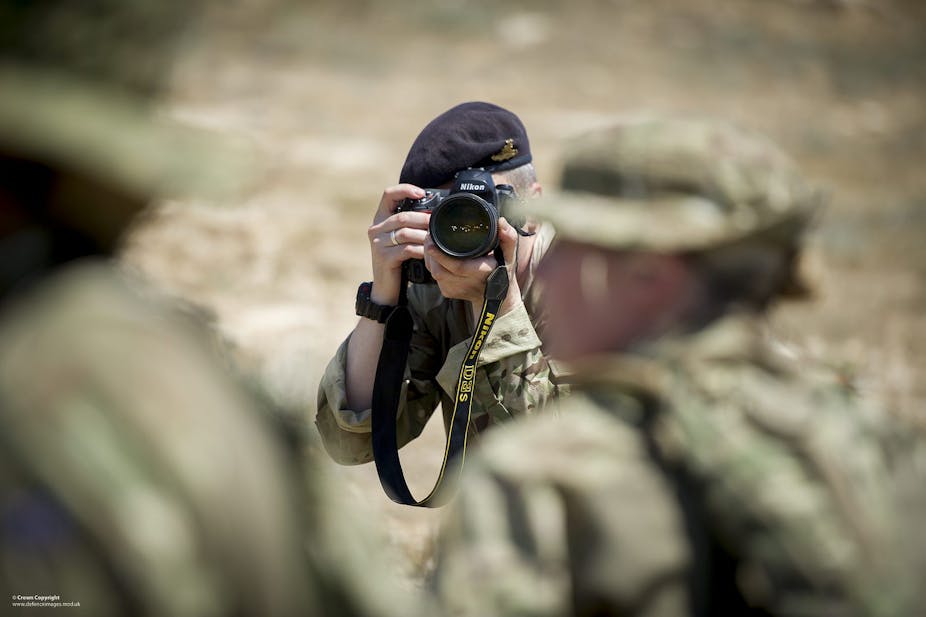By now, millions of people around the world recognise the face of Alexander Sotkin. This young Russian soldier posted selfies on Instagram that appear to place him in Ukrainian territory over the past few weeks. To some, this qualifies as evidence of Russian military presence in eastern Ukraine, making social media a valuable source of intelligence gathering. Others just think Sotkin made a stupid mistake in enabling his posts to be geo-tagged.
Whether this was an accident or a calculated tactic in an information war, we’ve seen in this case that when soldiers use social media, there is potentially a significant fallout, but this is certainly not a new trend or an isolated incident. We’ve been working for some time to look at how the UK military deals with social media.
Military matters
Modern militaries exist in a new media landscape, where geo-tagged photos, real-time tweets and regular Facebook updates are everyday occurrences. Soldiers, armed with an internet connection and a Twitter account, can share their experiences of life on the front line with anyone who cares to follow them.
The UK military has accepted these realities and put in place an online engagement strategy, which, in theory, actually encourages the use of social networks. Terms and conditions apply, of course. There is an expectation that soldiers maintain a sense of responsibility and a mindfulness of both personal and operational security to navigate their online communications. So while there is official support for social media use, it is far from unfettered.
If the past few years have shown us anything though, it is that the military is increasingly willing to engage with new media. This is in part fuelled by the need to tackle security concerns head on. Sotkin’s case is a particularly stark example of what can happen when such concerns become reality.
Official UK guidelines encourage soldiers to avoid identifying themselves as members of the military and, as graphically illustrated by a recent awareness campaign, to think before they share anything online.
The guidelines recognise the damaging effects that any misuse of social media can have on group morale and on external public sympathy and support. They centre around different levels of protection: the protection of military members and their families; the protection of the military institution; and the protection of military reputation.
Connected but distant
One might rightly ask why the military allows the use of social media during overseas deployments at all, considering the obvious risks to security, but there are a number of good reasons.
At best, social media presents the UK armed forces with a double-edged sword. It may add a new security risk, but used properly it may also serve an important function in strengthening the morale and wellbeing of soldiers and their families. Indeed, there is an increasing expectation among personnel that they will have regular access to social media and it would be wise to respond to it.
In fact, access to online communication is a top priority for many soldiers serving overseas. It allows them to maintain close relationships with home. Families and friends also find social media a vital lifeline to bridge the distance and dislocation of forced separation. The value of integrating social media into the armed forces is thus as much about the personal benefits to military personnel and their families, as about the perceived strategic advantages.
Rather more problematical though, is that social media also offers an easily accessible platform for information to slip out, unintended consequences and for rumours to flourish, some of which might be disruptive. These can damage organisational hierarchy, undermine trust in command or between soldiers, amplify existing problems and erode morale.
Although it is important to acknowledge such issues, it is equally important not to understand discussions about social media and the military as a security issue alone, or simply as a problem. Within the UK military there is an underlying appreciation that the integration of social media builds as much on education and behavioural change as regulation.
It is probably unlikely that one Instagram incident will lead to significant change in the way the Russian military handles social media but in the UK, the increasing use of such sites is likely to reshape defence communications policy in the next few years.
With recruitment numbers dwindling, with the risk of further defence cuts looming, and with a new military employment model imminent, military personnel are facing a period of radical change. Social media is one such challenge but, if used intelligently and sensitively, it may also be a means of negotiating new bonds of trust, community and support between soldiers, their families and the military establishment.

